|
43
   and 106 Limekiln Street and 106 Limekiln Street
 
Dover
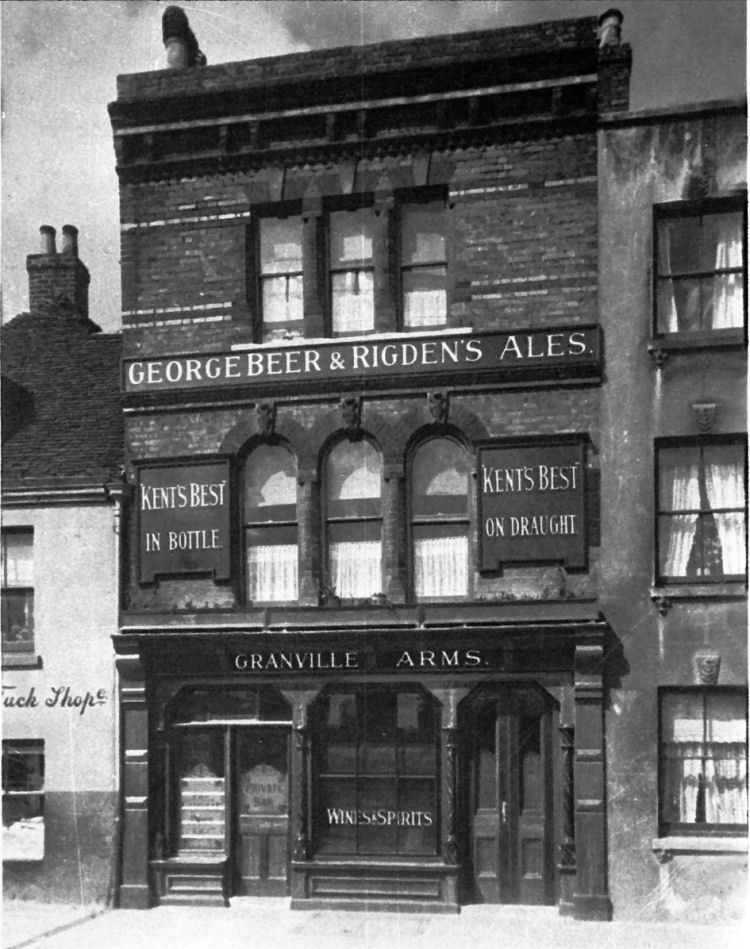 |
|
THIS George Beer public house in Limekiln Street. the
Granville Arms, next to the Tuck Shop was one of around two dozen Dover
houses featured in a set of photographs lent to me over a decade ago by
my former choirmaster at St Martin's, the late Fred Simpson. Fred, who
later sang at St Mary's church, was a near neighbour when I lived in Markland Road and he was involved in building maintenance. At a recent
Pierites reunion I was asked by a former licensee's son if I could
locate a photo of the nearby war damaged pub "The Mitre", which was in Snargate Street. Can any reader help, I wonder? (Bob Hollingsbee).
|
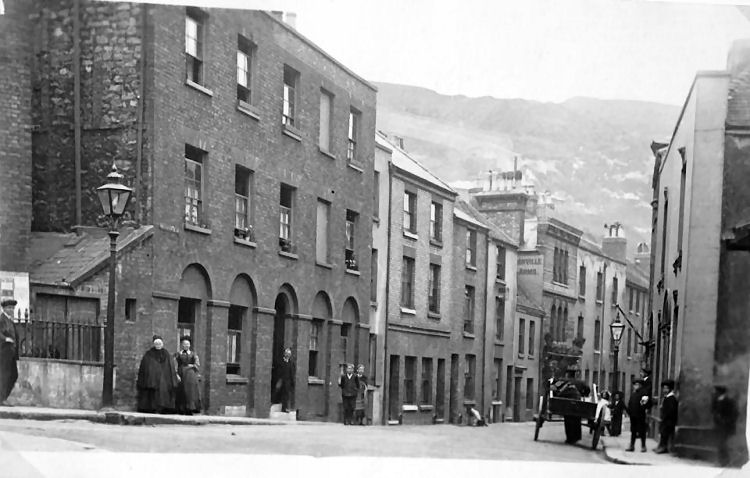 Above photo, date unknown, showing
Limekiln Street view from Bulwark Street, the "Granville Arms" is seen
behind the horse and cart, kindly
supplied by Lisa Hudson. |
|
From an Email sent 5 August 2011.
Chris Grimes has kindly be asking
people if they have any photographs of pubs for me and below is the
first of the replies.
Hi Chris,
Better late than never, one pub photo.
The name is okay but the street I am not certain of it could well be
Limekiln Street.
Regards Bob.
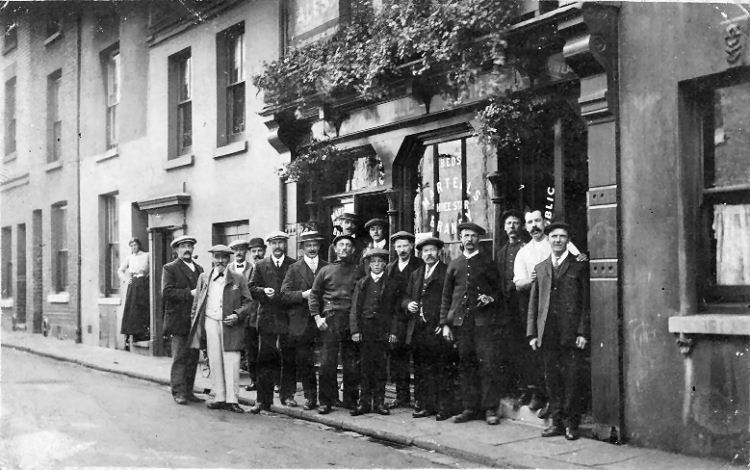 |
Formerly the "Donegal Arms", the name changing about 1867,
around about the same time that the "Return," in
Adrain Street, changed names to the "Granville
Arms."
For many years the number was 106 and it was always referred to then as the
"Granville Inn", there was talk of renumbering the street in 1874 and it
would have been done also in 1935. It must have proved necessary also after
world war two but I have no knowledge. Once the number became 43 it was
always "Arms" and the bomb damage of September 1940 was made good at a cost
of £617. It was part of a compulsory purchase area and the Corporation had
to withdraw the notice to treat to allow that work to proceed.
The closure came in 1967 and the site has since been used
to park lorries and trailers.
For photo of Limekiln Street click here.
|
From the Dover Express and East Kent News, Friday,
22 January, 1869.
MYSTERIOUS DEATH OF A SOLDIER
An inquest was held at the "Granville Inn," Limekiln Street, on
Monday afternoon last, by the borough coroner, W. H. Payn, Esq., on the
body of William Thompson, belonging to the 1st Battalion of the 4th
Regiment, stationed at the Western Heights, who had met his death by
falling off the cliff near the South Front Barracks on the previous
Sunday morning. Mr. Thomas Browning was chosen as foreman of the jury.
The body having been viewed, the following evidence was taken.
Sergeant Thomas Sanders, of the 4th King's Own Royal Regiment, said;
I am stationed at the Citadel Barracks, Western Heights. The deceased
belonged to the C Company of the same regiment. He had been in the
service thirteen or fourteen years. his age, I believe, was between 32
and 33. He was rather given to intemperance. The last time I saw him
alive was on Saturday morning last, he was then in the barrack-room. I
have been given to understand that he had a pass on Saturday until
eleven the same night, signed by the colonel of the regiment. The first
I heard of his death was on Sunday morning. I have heard of no quarrels
between him and any other person. He was not at all quarrelsome, but was
rather a jocular man. When I last saw him nothing whatsoever was the
matter with him.
Captain John William Fry, of the 91st Highlanders, stationed at the
South Front Barracks, said: On Sunday morning, about five minutes to
eight, I was going up the Military Road, and when about 150 yards from
the South Front Barracks, under the cliff, I saw a soldier lying on the
ground. I went up to him and imagining him to be drunk, went immediately
for an escort; but on coming up to him a second time I found him to be
dead. I sent the escort for a stretcher, and had him conveyed to the
hospital. When I found him he was lying on his right side, in a sloping
direction, with his head downwards. It appeared to me as if his neck was
broken. Blood was issuing from his mouth. he must have fallen from the
top of the cliff, which is about eighty feet high. There were several
flint stones lying about near to the deceased. The uniform of the
deceased was very tidy. I should think that he was not intoxicated at
the time of the accident. I should say he had been dead five or six
hours. I did not notice any cut on his neck. There was very little blood
upon the ground near the deceased.
James William Ward, a private in the same regiment as the deceased
said: I am stationed at the Citadel Barracks. The deceased was not in
the room in which I belong, but I knew him. The last time I saw him
alive was on Saturday evening about twenty minutes past eight. he was
opposite the church at the Western Heights, going towards the Citadel
Barracks. I cannot say whether he was tipsy or sober. I bade him good
evening, and he returned the salute. It was very wet and foggy at the
time. I did not stop or speak to him. There were four men with him at
the time I saw him. It was so foggy that it was impossible to tell to
what regiment the four men belonged. I do not know how he came by his
death. The deceased had only his red coat on, but the other four men
were wearing their great coats. in going towards the Citadel Barracks he
should have gone to the left, and not to the right. he was not generally
a sober man. I should say the men that were with him belonged to the
91st Highlanders, because the men belonging to the 4th Regiment are not
allowed to wear their great coats into the town. There are railings
along the top of the cliff where the deceased fell.
Mr. Joseph Vavasour Lane, assistant surgeon in charge of the 4th
Regiment, quartered at the Citadel barracks, said: On Sunday morning
last at about half-past nine, it was reported to me that a man belonging
to the 4th Regiment had been killed and was lying at the dead-house. I
was told that he had fallen from the cliff near the South Front
Barracks. I went and examined the deceased, and found that his right jaw
was broken. His right arm was also broken, and he had a deep cut on the
right side of his neck, about an inch below the jaw. i should say the
fall from the cliff would be sufficient to cause death, but the external
injuries he has sustained would not. The internal organs might have been
ruptured, which would have been sufficient to cause death. I think the
cut in the neck might have been caused by the deceased falling on a
flint.
There being no more witnesses present, the jury, after a short
consultation, determined to adjourn the enquiry until Wednesday, in the
expectation of obtaining further evidence as to the four men who were
seen by the witness Ward in company with the deceased, and also that of
a post mortem examination might be made on the body.
THE ADJOURNED INQUEST
The jury met again on Wednesday afternoon, when the Coroner stated
that he had written to the colonel of the deceased's regiment about the
four men, but had received no reply. The police had also been
instructed, but had been unable to discover the men. The Coroner also
stated that he had written to the surgeon and instructed him to make the
examination ordered by the jury.
The doctor stated that he had made a post mortem examination of the
deceased on the previous afternoon. His evidence was as follows: First I
examined the injury in the neck, which was about half an inch in breadth
and was punctured fully three quarters of an inch in depth. It was
situated about an inch and a half below the angle of the jaw, and was
somewhat behind it. It touched no vessel of importance, and was not the
cause of death. he might have died from a number of causes. He had
extravasation of blood on the right side of the brain. He had a fracture
of the bone of the arm. All the ribs on his right side were broken and
the points had torn the lung, causing the effusion of blood which was
seen upon the ground. The liver and both kidneys were ruptured.
A Sergeant of the 4th Regiment, who had previously examined, stated
he had made all enquiries in respect to the men seen in company with the
deceased, but had failed to discover them.
The jury returned an open verdict - "That the deceased, William
Thompson, was found dead at the foot of the cliff near the South Front
Barracks, Western Heights, at Dover."
|
|
From the Dover Express and East Kent News, Friday 9
April, 1869.
MURDER OF AN ENGINEER SOLDIER AT DOVER
At the Borough Police Court this (Friday) morning before E.
Dickenson, J. G. Smith, and C. Stein, Esqs., a lance-corporal of the
Royal Engineers stationed at the Western Heights, Dover, named Charles
Wellryck, was charged with having shot dead this morning a sapper in the
same corps, named William Barnes.
After reading of the charge to the prisoners, Thomas Handcock
deposes: I am a sapper in the Royal Engineers, stationed at the Western
Heights Barracks, Dover. Prisoner is a lance-corporal in the same corps.
Shortly after seven o'clock this morning I was standing with my back to
the prisoner when I heard the report of a rifle. Upon that I turned
round and faced prisoner, and saw him drop the rifle upon the floor. The
smoke was coming from the rifle indicating its recent discharge - there
was also the smell of powder. I then turned to the left and looked and
saw sapper Barnes bleeding from a wound in his cheek. I said, "Oh,
Barnes is shot." Barnes after sitting upon his bed when he was shot,
about 16 feet away from the prisoner. I immediately went to Barnes and
took hold of his head. Finding there was no pulsation, I said he was
dead. There were eight other sappers in the room where the shot was
fired. I called for some one to fetch the doctor, who was brought to the
room shortly afterwards. I never heard the prisoner utter a word.
Prisoner did not use his rifle after he dropped it, and he made no
attempt to escape. I have known the prisoner for the last three years
and have of late noticed a peculiarity about his behaviour. He seemed
melancholy. If a person asked him a question, it was ten to one if an
answer were given. Prisoner had been in the hospital two or three times
during the last three months. He had had no quarrel of any kind with the
deceased that I knew of. It was the duty of all of us to clean our
rifles this morning, as we were under orders to march to Shorncliffe.
There was therefore nothing strange in prisoner having his rifle in his
hand.
Sapper Benjamin Batten, R.E. who was in the room at the time the shot
was fired, and standing almost 7 feet from the prisoner, gave
corroborative evidence; but did not see the shot fired. The shot passed
over his shoulder. He then said - as soon as I saw the shot had been
fired by prisoner, I laid hold of him, and, assisted by a sapper named
Grant, took him from the room. When I got downstairs I said to the
prisoner, "What did you do that for?" and he replied, "he was no good."
I then said, "Did you intend to shoot him?" and he replied, "I did not
." Prisoner's conduct during the last six months has been so strange
that I have been frightened out of my life at his being about the place.
I have been awake for hours for fear of what he might do. I do not think
it was safe for him to be in the room. he has been sent to the hospital
once or twice lately. I was on good terms with the prisoner, and so also
was Barnes. Barnes never spoke a word to him this morning, nor he to
Barnes. Prisoner has been in the habit lately of talking and swearing to
himself. Before prisoner became in this strange way, he was a quiet,
inoffensive man, and I never heard him swear then.
Sergeant Robert Langstaffe, R.E.: This morning we were ordered to
Shorncliffe. I ordered the prisoner to hand over the bedding of the non-commissed
officers and men in his room to another sergeant. he undertook the duty.
After leaving the barrack I heard a shot fired, and on returning to the
room saw Sapper Barnes leaning on his bed with a wound in his face. On
looking round the room I saw a rifle lying on the floor. On picking it
up I saw it had been recently discharged, and on opening the breach saw
it had in it the remains of a cartridge. On examining the ammunition in
prisoner's pouch I found one round missing from the packet. I have been
in prisoner's company about three months, and from his general
appearance consider that he has been in an unsound state of mind since
discharged from the hospital. On the 8th Feb., I ordered the prisoner to
the hospital because of the men refusing to work with him on account of
his peculiar manner, and of his making three attempts to strike a sapper
over the hand.
Andrew Acreson Stoney, surgeon-major of the 91st Regiment, gave
evidence showing that prisoner had several times recently been in the
hospital upon suspicion of insanity, and had several times been
discharged. For fifty days he had been in the hospital, under the
observation of witness and the assistant surgeon, and both of them
agreed that they could find no trace of insanity, although the prisoner
had a peculiar habit of keeping to himself, and declined to speak to
anybody. he had never showed signs of violence, and therefore they did
not consider it unsafe for him to be at large. He had examined the
deceased, and found that the ball entered his face, penetrated the
skull, and came out the back.
Police-constable Gedded deposed to taking prisoner into custody, and
receiving the fire-arms, &c., from Sergeant Robert Langstaffe.
Prisoner made no answer whatever when the charge and caution was read
over to him.
He was then committed for trial at the next Maidstone Assize, upon
the charge of wilful murder.
The inquest on the unfortunate man will be held this evening at six
o'clock, at the "Granville Inn," Limekiln Street.
|
|
From the Dover Express and East Kent News, Friday, 13
May, 1938.
GRANVILLE ARMS DART TEAM
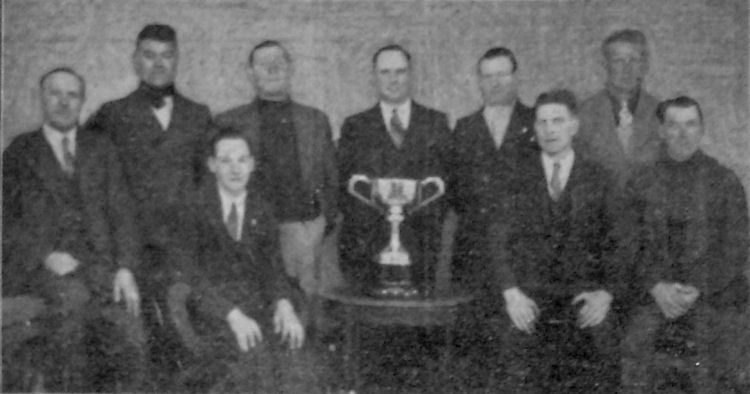
WINNERS OF THOMPSON'S (WALMER ALES) BREWERS CUP.
Reading from left to right:- Messrs. Parkes, Brankley,
Simpson (secretary) Clarke, Godden, Rogers, Curtis, Nix and Wilson.
[Photo: Packham, Castle St. Dover]
|
|
From the Dover Express and East Kent News, 19 May 1939.
At the Dover Police
Court, on Friday, the licence of the "Granville Arms," Limekilm Street, was
temporarily transferred from Mr. E. W. Wells, who has been licensee since
1922, to Mr. E. A. Worsley, formerly a Dartford Police Officer.
|
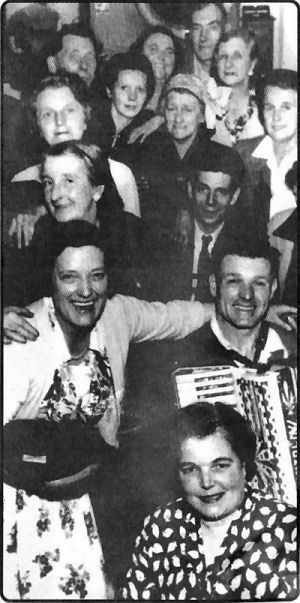 |
This interesting memento was one of the old photographs which came to light as
a result of the organisation of the recent 'Pierites' reunion at the
Cricketers at Crabble for former western docks area residents. The happy crowd
was pictured during the regulars' annual outing from the Granville public
house in Limekiln Street. about 1950. The old pub used to stand
opposite the well known Archcliffe Fort public house. |
|
From the Dover Express and East Kent News, 20 August, 1954.
Bomber Man for "Granville Arms"
The new licensee of the "Granville Arms," in Limekiln Street - the
licence was temporarily transferred from Mr. James Doody, by Dover
Magistrates on Monday - is 41-year-old former Squadron Leader William
George Wesley, D.F.C.
Besides having a distinguished career in Bombing Command during the
war, Mr. Wesley was a well-known cricketer and ex-Spartan League
footballer.
The old licensee, Mr. Doody, is going to Stoke-on-Trent.
|
LICENSEE LIST
PATTERSON B 1864 ?
From the "Donegal Arms."
 HAMBROOK Charles Richard 1871-82+ (age 49 in 1871
HAMBROOK Charles Richard 1871-82+ (age 49 in 1871 ) )
 
HAMBROOK Mrs Louise Jane 1891-1903+ (widow age 71 in 1891 ) )
     
MARTIN Fred Charles 1904-07 end
PILCHER Mrs Anne Elizabeth 1904-07 end
HOLLAND/HOWARD Fred William 1907-Jan/14 ( HOWLAND)
HOWLAND) 
SUMMERTON Mr H Jan/1914-Oct/22
 
WELLS Ernest William Oct/1922-39 end
    
WORSLEY Albert Ernest 19 May 1939-43 end

BEST Desmond Robert 1943-45 end
CAIRNS James F R 1945-49 end


HETHERINGTON Charles Richard 1950-51 end

ROY Leslie 1951
DOODY James 1953-Aug/54
  (bed and breakfast) (bed and breakfast)
WESLEY William George Aug/1954-56+
 
I believe this to be HOLLAND or perhaps Holland is
Howard!
 From the Post Office Directory 1874 From the Post Office Directory 1874
 From the Post Office Directory 1882 From the Post Office Directory 1882
 From the Post Office Directory 1891 From the Post Office Directory 1891
 From Pikes Dover Blue Book 1895 From Pikes Dover Blue Book 1895
 From the Kelly's Directory 1899 From the Kelly's Directory 1899
 From the Post Office Directory 1901 From the Post Office Directory 1901
 From the Post Office Directory 1903 From the Post Office Directory 1903
 From the Kelly's Directory 1903 From the Kelly's Directory 1903
 From Pikes Dover Blue Book 1909 From Pikes Dover Blue Book 1909
 From the Post Office Directory 1913 From the Post Office Directory 1913
 From the Post Office Directory 1922 From the Post Office Directory 1922
 From Pikes Dover Blue Book 1924 From Pikes Dover Blue Book 1924
 From the Post Office Directory 1930 From the Post Office Directory 1930
 From Pikes Dover Blue Book 1932-33 From Pikes Dover Blue Book 1932-33
 From the Post Office Directory 1938 From the Post Office Directory 1938
 From Pikes Dover Blue Book 1938-39 From Pikes Dover Blue Book 1938-39
 From Pikes Dover Blue Book 1948-49 From Pikes Dover Blue Book 1948-49
 From the Kelly's Directory 1950 From the Kelly's Directory 1950
 From the Kelly's Directory 1953 From the Kelly's Directory 1953
 From the Kelly's Directory 1956 From the Kelly's Directory 1956
 From the Dover Express From the Dover Express
|




